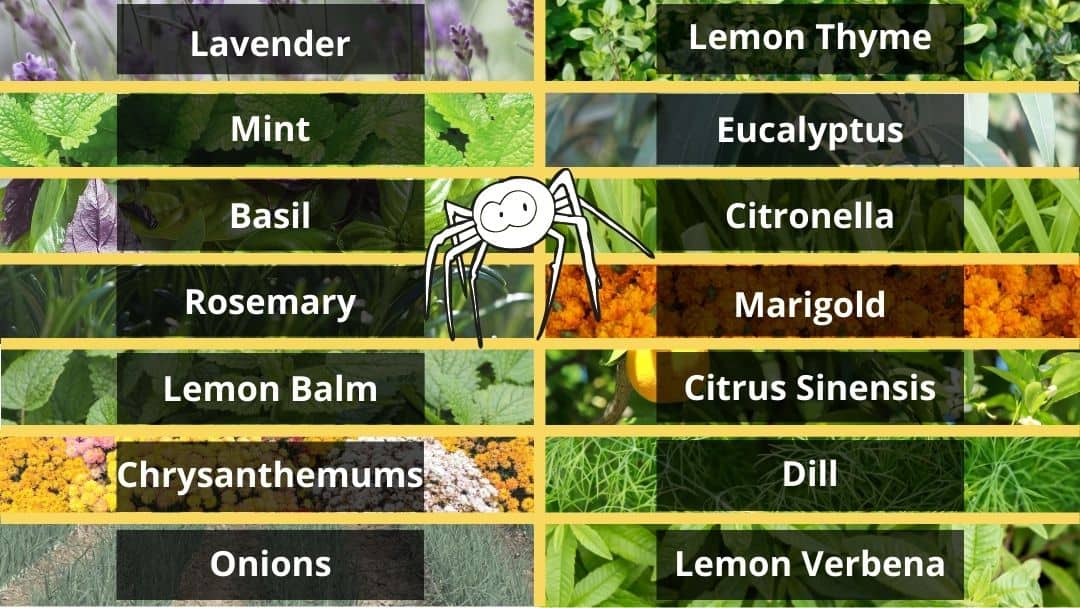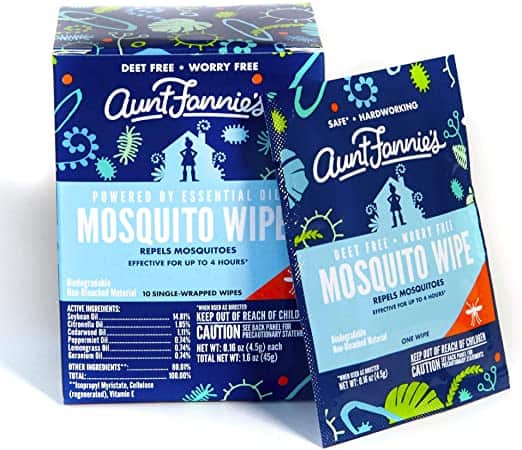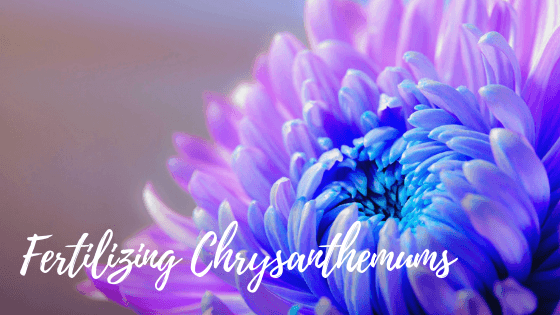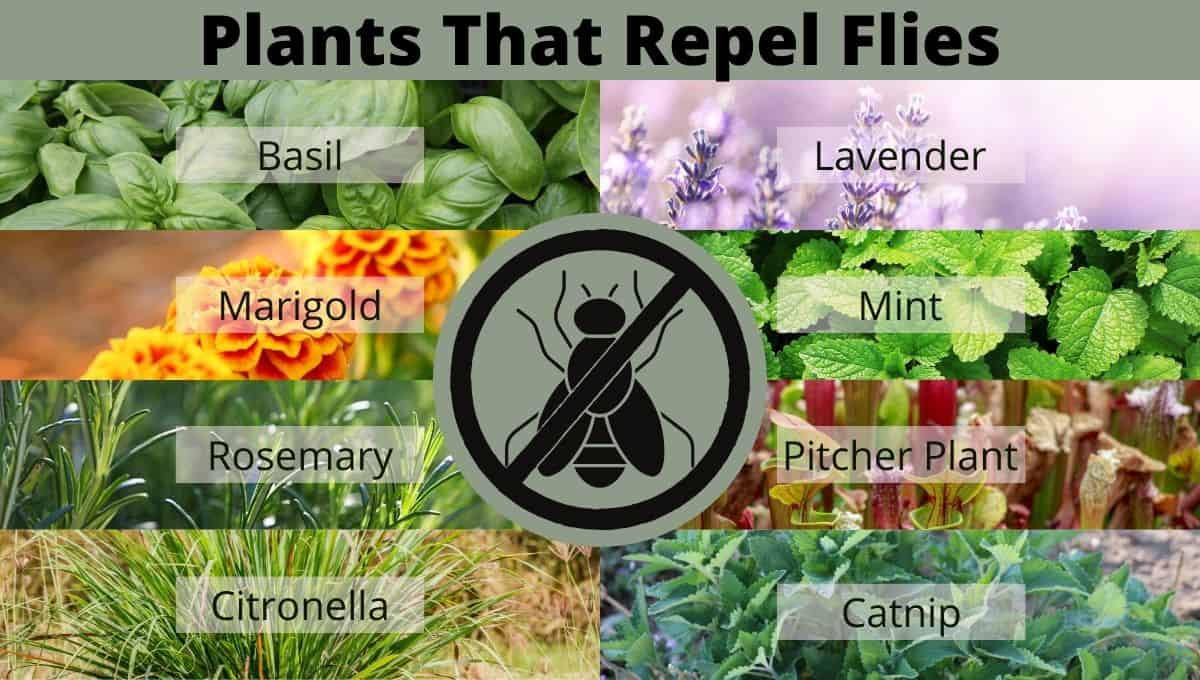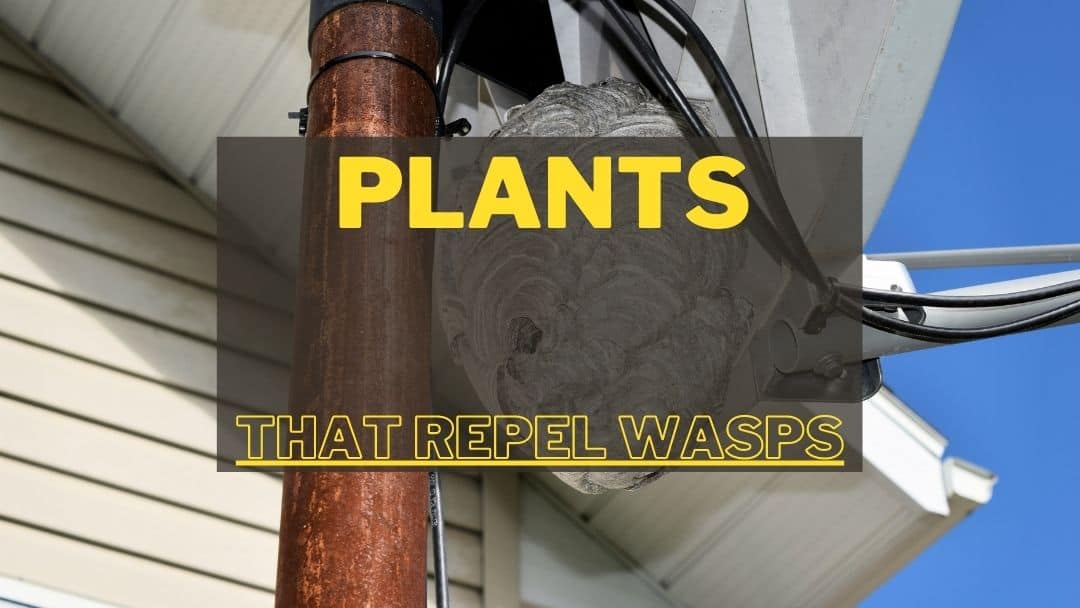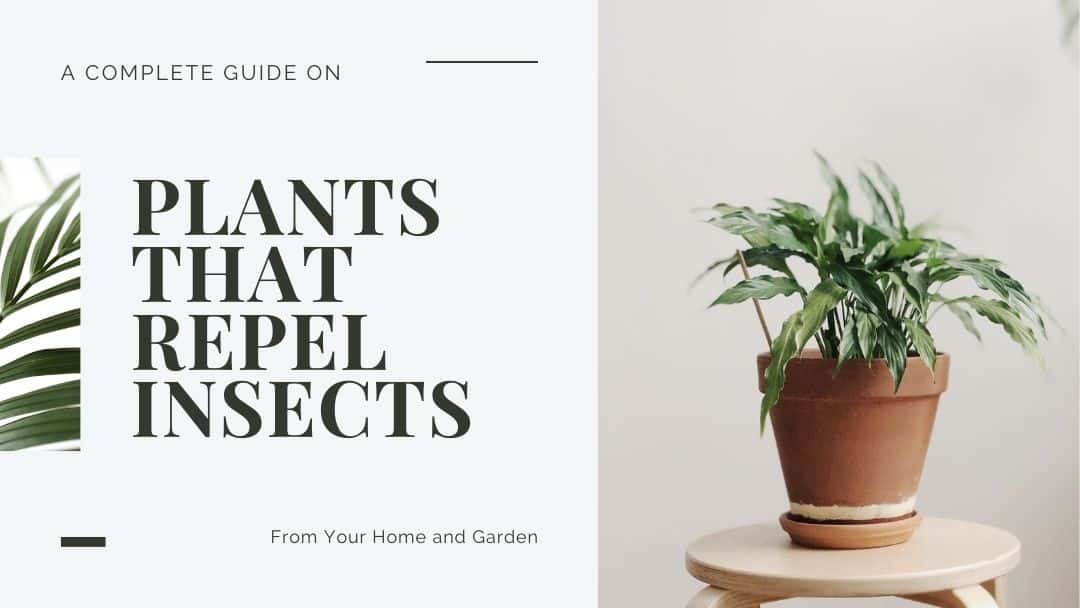14 Plants That Repel Spiders
A lot of the people I know hate them…Spiders are the spooky, creepy insects that create nightmares. Not too long ago at all, the sight of a spider crawling up doors or spinning webs on a tree was a bit problematic for me.
It’s not so bad anymore. Realizing that most spiders are harmless to people and beneficial to growing a garden helped me a bit, but there’s still that knee-jerk reaction when you walk into a room, only to find a spider staring back at you through eight black eyes like some demon-spawn straight from hell! Okay…yea I still hate them too!
If you see a spider climbing up your wall or crawling in your grass though, don’t immediately run for a pesticide spray and drench your crawly friend like I used to! A good garden book I read recently says most insecticides that repel spiders have harmful chemicals that endanger the environment, both inside and outside.
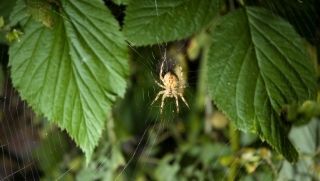
Be careful if you use pesticides on your garden plants for any reason. Not too long ago, pesticides were the way to rid your garden of spiders. You don’t know what chemicals in pesticides can do to your yard though, and your attempt to repel spiders can cause the death of plants, while also polluting our lakes and rivers. Instead, use nature’s natural pest repellents to repel spiders from your home and yard. Most of these plants that repel spiders smell delicious to humans, but they’re also the smells designed perfectly by mother nature for a natural spider repellent.
Lavender (Lavandula)
Lavender is a beautiful herb with its spindle-like purple flowers and its awesome smell. You can cultivate this flower in your garden or a flower bed, pots on the patio, and even in containers indoors. Put a pot of lavender on a windowsill, and spiders will think twice about using your window as an entry point to your home.
A well-known horticulturist says it’s easy to make a DIY spider deterrent spray with lavender. To repel spiders from crawling in living areas, use an essential oil spray made of lavender essential oils and water in a spray bottle. This essential oil spray does not kill the spider, but the spray creates an environment that spiders don’t like. To a spider, lavender smells just as disgusting as those mothballs grandma used to use around the house. Gross!
- Lavender needs full sun.
- Well-drained soil.
- Maintain next to sunny windows in the house.
- Plant lavender that has well-established root systems.
- Make sure the hole is twice as deep and twice as wide as the root ball when planting lavender outdoors.
Lavender needs to live in low to moderately fertile soils, and it’s not recommended to amend soils with too much organic matter. Indoors, plant your lavender in a pot by using a soil mix with gravel or sand. Fluff up the leaves and flowers, and no spider will come near your plant.
Mint (Mentha)
Mint plants include peppermint, catnip, and spearmint, and all kinds of mint oil repel spiders. Mint plants also repel mosquitoes, aphids, and ants away from your home. Great ideas for home pest control are to use the essential oils in mint for aphid and spider repellent recipes. The essential oils in mint plants are found in many homemade aphid and spider repellent recipes you can find online.
An expert gardener says that mint plants will quickly spread though once they’re planted, and they require full sun and little shade. Keep them well-watered and use mulch lightly.
Peppermint or spearmint plants are great in a pot in your home, or use them as ground covers in flower and vegetable gardens. Your reward will be no spiders or bugs, plus fresh leaves for your lemonade or teas.
Basil (Ocimum basilicum)
Basil is an extremely easy herb to nurture and one of the best options for keeping any spider away. Hate houseflies and mosquitoes, too? Plant some basil.
- Plant a pot of basil and keep it in your kitchen.
- Houseflies and mosquitoes will stay away.
- Basil smells wonderful.
- Basil is great as a ground cover.
- A spider hates the smell of basil.
- Put basil in a tasty soup or stew.
Basil likes full sun and prefers natural soil. I find that it really takes off around August for me most years. Plant basil outside at a time of year after the danger of frost is past, and you’ll have a good natural spider repellent and also a herb to spice up your dishes.
Rosemary (Rosmarinus officinalis)
Rosemary is a perennial herb, but it does not like cold weather. You can plant rosemary in a pot or container and preserve it outdoors on your patio.
- Grow rosemary in your garden around your other plants.
- Spiders, and surprisingly cats, don’t like the smell of rosemary and will stay away.
- Rosemary is beautiful!
- Environmentally friendly when grown in a rose garden.
- Pinch the leaves to get a great aroma.
- The small purple flowers make rosemary a great herb when combined with other flowers.
- Rosemary likes being planted in good soil.
- Cultivate rosemary next to a southern wall for protection.
- Place in direct sunlight to flourish.
- You need to cultivate it in well-drained soil.
If you’re planting rosemary in a pot, use lightweight potting mix and hold the soil evenly moist. If you keep rosemary in the house, a knowledgeable horticulturist says to allow the potting mix to dry out before watering completely. You can apply mulch around rosemary plants in an outdoor setting to maintain their safety in cooler weather.
Lemon Thyme (Thymus x citriodus)
Lemon thyme makes a great addition to any herb or flower bed. It’s used in cooking, has attractive foliage, and keeps spiders away. Ideas for lemon thyme include using lemon thyme to attract bees to help pollinate surrounding plants. This plant looks like an evergreen shrub, and it has a distinctive lemon scent.
Lemon thyme enjoys full sun and requires well-drained soil. Lemon thyme doesn’t care if the soil conditions are poor, and it’s amazingly drought resistant. Keep lemon thyme near your doors, and bothersome spiders will stay outside.
Eucalyptus (Eucalyptus spp.)
Eucalyptus smells so strong it is no surprise that it keeps away bugs, insects, and spiders. Growing a full-sized eucalyptus tree is not usually included in the list of great ideas for around the suburban home though. It’s a huge tree! However, there are dwarf varieties that still have a strong repelling smell.
To cultivate eucalyptus:
- Trim the bush constantly.
- In cold weather, bring the eucalyptus inside.
- Grow eucalyptus as a yearly plant.
- Eucalyptus does require full sun.
- Needs fertilizer.
- Loves to look out a window facing south.
The eucalyptus adapts to most potting mixes, and you’ll need to feed the plant using liquid food. Maintain your watering schedule at once a week, since eucalyptus cannot tolerate over or under-watering. Plants do not transplant well, and if it outgrows its pot, you might as well throw it away and start all over with a new pant.
Citronella (Cymbopogon citratus)
Citronella or lemongrass is not the most beautiful plant to grow, but it’s commonly seen in clumps outdoors or in a pot indoors where mosquitoes are a concern.
- Citronella has an essential oil that repels spiders, ants, mosquitoes, and many other bugs.
- A book on gardening says citronella oil can prevent a spider from crawling up your walls.
- Does not work well in winter.
- Plant citronella in a container and put in your home.
- Use a good source of purified water.
- Don’t let the roots dry out fully.
- Place it in a window that faces south, and water sparingly.
Crush the leaves in your hands, and oils that repel almost every single spider will be released. Crushed citronella leaves are also great if you want to make a fly spray from natural ingredients.
Marigold (Targetes)
Marigolds are pretty in your yard. Cultivate marigolds in your flower or vegetable garden beds, or even in pots on the porch.
- American Marigolds repel many different pests – spiders, mosquitoes, ants and lice.
- Cultivate marigolds everywhere in your garden.
- They do not have the most appealing scent, but they keep away the pests.
- Place them in an area where they will get full sun.
- Ensure sure the soil is moderately fertile and well-drained.
- Use a soil-based potting mix if you pot marigolds in a container.
- Water frequently during heat waves and let the compost dry out between watering.
Marigolds can be grown in the house, but it is not recommended since they will grow spindly stocks and small flowers.
Repel Spiders with Lemon Balm (Melissa officinalis)
Lemon Balm grows fast and as invasive as mint, so be cautious when planting lemon balm in your home garden. Lemon balm has a strong scent that repels spiders and fruit flies. Keep lemon balm in a pot inside your kitchen to keep away pesky fruit flies and crawly spiders.
Lemon balm plants like well-drained soil and a pH level from 6.7 to 7.3. Water regularly since lemon balm cultivates well in somewhat moist soil when in the ground or a pot. If you have lemon balm outside, keep it protected in the winter. Better yet, plant lemon balm in a pot and bring it indoors during colder months.
Chrysanthemums (Chrysasnthemum morifolium)
Chrysanthemums morifolium or mums contain pyrethrin, which is an insect-repelling compound used in some pesticides. Mums need sunny locations, but if you do not want spiders in your flower beds, mums are great as spider repellents.
- Deadheaded or remove the dead blossoms to encourage flowers.
- The more flowers your mum has, the fewer spiders you will see.
- Chrysanthemums can be found growing outdoors as well as indoors.
- Most chrysanthemums do well in well-drained soils.
- Adapt to different soil types.
- Mums thrive in the shade.
- Best when planted in full sunlight.
Mums make awesome house plants; keep them watered, and the flowers deadheaded.
Onions (Allium cepa)
Hate those pesky little spider mites that get on your flowers or in your vegetable garden? Well not as much as they hate onion…They’re a major problem because they cause yellowing leaves and stunt the growth of your cherished plants. If you are looking to stop spider mites as well as larger spiders, then plant onions. An old wives tale is to put onion slices in a bowl of water and place the bowl where spiders come into your home. It is worth trying, but it is better to grow onions in your garden to keep spiders away from the other vegetable plants. Onions do not make a good house plant anyway, at least that’s what everyone says. I’ve had some success with onions in kitchen windows with good sun exposure myself though, so who says it won’t work for you?
Dwarf Citrus Tree (Citrus sinensis)
The smell of citrus oil is a great option to keep spiders away. Spiders do not like citrus oil smells that come from lemons or oranges. You probably cannot cultivate huge citrus trees like most people with limited space. Still, you can grow dwarf citrus trees outside on a deck or patio and inside as an ornamental plant.
Some swear that leaving lemon or orange peels around repels spiders. You can also try rubbing lemon peels on baseboards and around windows to keep spiders away.
Dill (Anethum graveolens)
Dill does not give off an overpowering scent, but it is useful when you want to repel spiders. (Allium cepa) Dill is another variety you can try. Dill works best where it is planted, so plant dill in an area where you do not want spiders.
If you cultivate dill inside, make sure it has plenty of light. Dill doesn’t mind either hot or cold weather, which makes it extremely easy to grow. Dill is self-seeding, thrives in different poor soils, but needs a dirt mix that drains well.
Lemon Verbena (Aloysia citrodora)
Lemon verbena is a perennial with glossy, rough leaves that are somewhat pointed. These plants can reach up to nine feet tall and emit an overpowering scent when leaves are bruised.
- Keeps most spiders away because of the smell.
- Lemon verbena does grow large.
- Place a bush or two near the doors to your home to keep out creepy crawlies.
- You will need a 12-inch pot with a quality potting mix.
- Place Lemon verbena in a sunny window if you want lemon verbena to thrive.
- Lemon verbena needs all the sunlight it can get during the winter months.
Outside, plant lemon verbena next to a light-colored wall or a light-colored fence to give it reflected light. Too much shade on your lemon verbena will cause skinny stems, poor leaves, and low essential oils. The plant will need frequent fertilization. Allow lemon verbena to become under-active during the colder months.
This herb is also perfect for flavoring your fish dishes!
No matter where you live, spiders will enter either inside your house or bug you outside in the garden. Even small spiders are the perfect keepers of the environment though. They prey on pests and have a role to fill in our ecosystem. Still, if you have arachnophobia, you don’t want to see a spider indoors or outdoors. To keep spiders to a minimum, use nature’s spider repellent – plants.
An expert on the subject says plants that keep away spiders all have one thing in common – they have pleasant odors to people but are offensive to spiders and other pests. If you love to smell lavender and use it’s essential oils, grow it indoors to repel spiders. You can also bring mint plants inside to keep your house smelling nature sweet and also keep spiders from crawling up the walls.
A horticulturist speaking in a garden class I attended recently says to utilize spider repelling plants that grow annually like basil as soon as the ground is warm and the last chance of frost for the year is over. It’s the same time they’re getting to be active each year, so it makes sense to me.

